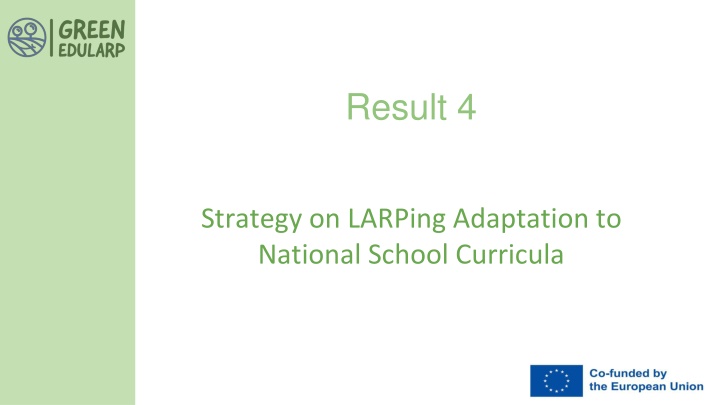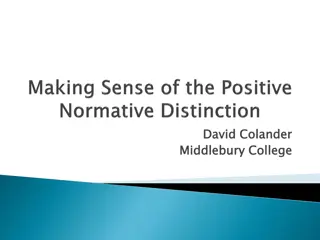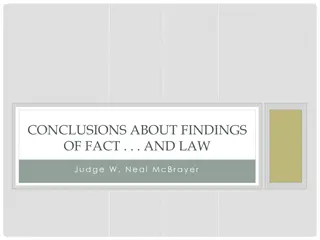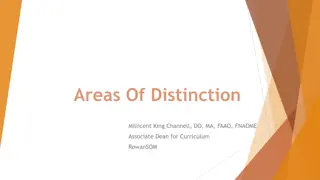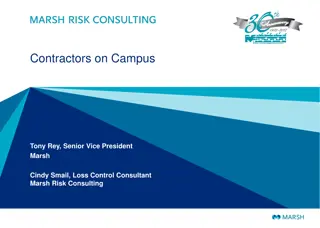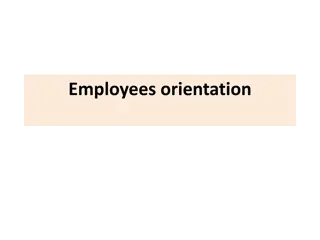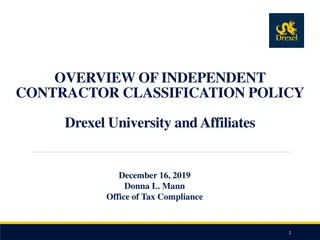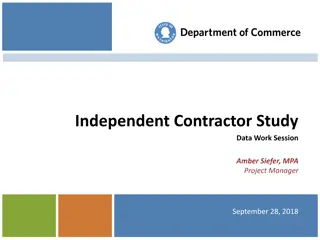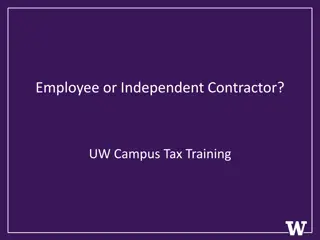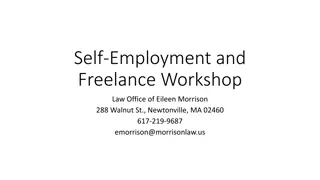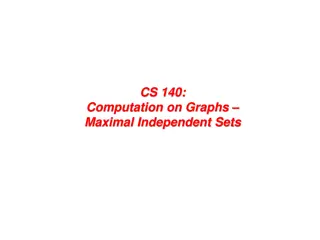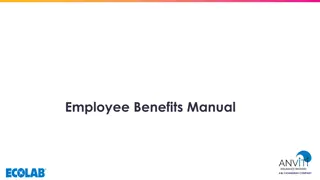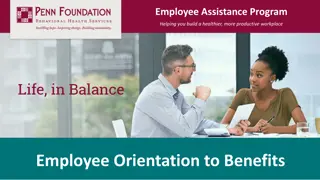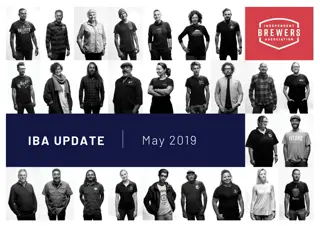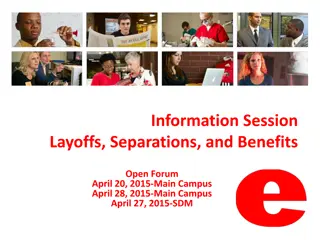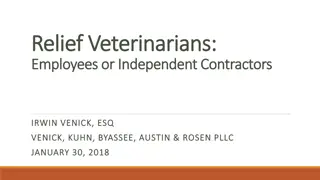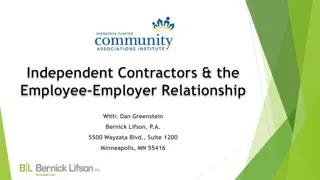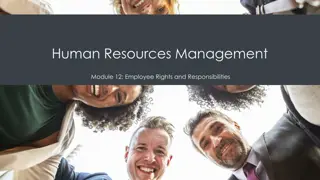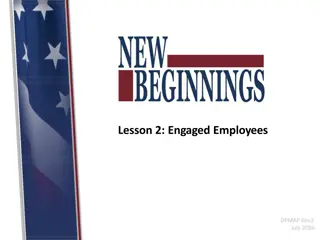Employee vs. Independent Contractor Distinction
The key differences between employees and independent contractors, why it matters, and the classification rules to determine status. Learn about behavioral control, financial control, and relationship factors. Understand the implications of misclassification and the IRS's scrutiny on this issue.
Download Presentation

Please find below an Image/Link to download the presentation.
The content on the website is provided AS IS for your information and personal use only. It may not be sold, licensed, or shared on other websites without obtaining consent from the author.If you encounter any issues during the download, it is possible that the publisher has removed the file from their server.
You are allowed to download the files provided on this website for personal or commercial use, subject to the condition that they are used lawfully. All files are the property of their respective owners.
The content on the website is provided AS IS for your information and personal use only. It may not be sold, licensed, or shared on other websites without obtaining consent from the author.
E N D
Presentation Transcript
Result 4 Strategy on LARPing Adaptation to National School Curricula
Task 1 State of the Art The objective of this study is to investigate the national Primary and Secondary Curricula in partner countries, aiming to identify the potential entry points for the incorporation of Educational Live-Action Role-Playing Games (EduLARPs) to environmental education. The investigation involved desk research as well as various data collection methods, including questionnaires and focus groups to gather the following information: Examples of National Strategies Approaches that support Gamification and Role Play in School Curriculum The Role of the Ministry of Education in the Formation of Curriculum Involvement of Schools, Principals, and Teachers in Curriculum Design Examples of Primary and Secondary Climate Change Curricula
National Strategies Approaches that support Gamification and Role Play in School Curriculum Examples of national strategies' approaches that support gamification and role play in the school curriculum, with a specific focus on environmental learning. How these national strategies have been designed and implemented to integrate gamification and education? role play into environmental How these strategies serve as entry points for the application of green educational live-action role-playing games (edularp) and the edularp method. By understanding these national strategies, educators, policymakers, and researchers can identify effective ways to incorporate gamification and role play, specifically within the realm of environmental education
National Strategies Approaches that support Gamification and Role Play in School Curriculum Estonia The objective of national curriculum of stonia socially active, responsible and environmentally conscious person who protects the environment and values sustainability and is ready to find solutions to environmental and human development Curriculum, 2011). is that a student becomes a issues (Basic School National The national curriculum fully support the implementation of: active teaching methods interdisciplinary integration learner-centredness and the development of key competencies. Educational role play (LARP) is one of the learning methods that enables the active participation of the learner in the learning process.
National Strategies Approaches that support Gamification and Role Play in School Curriculum Sweden LARP in Education It is not unusual in Sweden for schools, church activities and similar organisations to use roleplaying with an educational purpose, but most often these are drama exercises with a limited scope, rather than full-fledged LARPs. EduLARPs in Sweden have a clear pedagogical aim and are often combined with the school curriculum so that the participating students learn about different school subjects during a game. Extracurricular EduLARPs are organized by libraries, museums and other organisations and are mostly focused on their topics of interest (Using Environmental LARP in Education Practical Guidelines for the Integration of Environmental LARP into the Formal and Non-Formal Education in Estonian-Russian Border Area Tartu 2020) I
National Strategies Approaches that support Gamification and Role Play in School Curriculum Sweden grants given to schools, from kulturr det (Swedish Arts Council), its a government authority whose principal task is to implement national cultural policy determined by the Parliament. supporting arts, culture and international exchange. Skapande skola is the main grant for teachers to get people into the schools to work with cultural events, and roleplay. Students participate: in cultural life In cultural experiences in cultural and artistic expressions at school
National Strategies Approaches that support Gamification and Role Play in School Curriculum Poland In Poland, the method of teaching with the use of EduLarp is little known and not widely used. It is not listed as recommended in the curricula, but it is also not prohibited. Many organizations use EduLarp as a form of fun during summer meetings of children and young people. These organizations are mainly scouts and other organizations that do not have to implement the content included in the curriculum, but adapt the content to the subject of their camps or rest, e.g. during summer courses or summer camps. In schools, the EduLarp method is not common, but it appears and is implemented as a pedagogical innovation or as extra-curricular activities for students as part of Erasmus or e-twinning projects.
National Strategies Approaches that support Gamification and Role Play in School Curriculum Greece The methodology of role-playing games is well-known among educators, as it is taught at universities and there is also rich research material available (theses, doctoral dissertations, articles, etc.) However, methodology. there is no mention or knowledge about the Edu-LARP One of the subjects where the methodology of role-playing games is present is Drama Education. Drama Education in the Elementary School Curriculum: One of the objectives is the theatrical-pedagogical immersion in nature and its connection to environmental education, personal development, and solidarity (lifestyle ethics) with the aim of acquiring spiritual, emotional, and social skills.
The role of the Ministry of Education: Is it centralized or decentralized? The research endeavors to examine the degree of centralization or decentralization evident within the curriculum formation process across partner countries.
The role of the Ministry of Education: Is it centralized or decentralized? Estonia Every Estonian school is free to design its school curriculum and students individual study plans in such a way that they consider the needs and interests of students as well as the specifics of the region, while being in compliance with national legislation.
The role of the Ministry of Education: Is it centralized or decentralized? Sweden decentralized structure with a considerable degree of local autonomy in curriculum development and implementation the national government educational goals and standards, the responsibility for curriculum design and implementation primarily lies with the municipalities and schools. This decentralized approach allows for flexibility and adaptation to local needs schools and educators the freedom to shape their curricula within the framework provided by the national guidelines. sets overarching and contexts, granting
The role of the Ministry of Education: Is it centralized or decentralized? Poland In Poland, the core curriculum is centralized, on the basis of which the teacher selects the curriculum. The Minister of Education approves changes to the core curriculum.
The role of the Ministry of Education: Is it centralized or decentralized? Greece Greek educational system is centralized, with a significant level of central authority and control in the curriculum formation process. T Ministry of Education plays a prominent role in shaping and regulating the national curriculum. general framework and guidelines for curriculum development including subject content learning objectives, assessment criteria. This centralization ensures a standardized curriculum across the country, providing a common foundation for education.
The role of the Ministry of Education: Is it centralized or decentralized? However, it is important to note that within this centralized structure, there is some room for local adaptation and flexibility at the school level. Schools have the autonomy to make decisions regarding the specific implementation and organization consideration local needs and priorities while adhering to the broader national guideline. of the curriculum, taking into
The level of participation of schools,principals and teachers in the curriculum design process. In Estonia there is a strong emphasis on decentralization, granting schools and teachers autonomy in designing the curriculum. Schools have the freedom to adapt the national curriculum to meet the specific needs of their students and local context. a significant level of In Sweden, while the curriculum is centrally regulated, there is a collaborative approach that involves teachers and principals in the design and development of the curriculum.
The level of participation of schools,principals and teachers in the curriculum design process. In Poland, the curriculum is predominantly centralized, with the Ministry of National Education being responsible for its formulation. However, schools and teachers have some degree of influence through consultations and feedback mechanisms. In Greece, centralized, significant role. While there is limited involvement of schools and teachers in the initial design, there is some flexibility at the local level for adaptation and implementation. the with curriculum the design of process Education is primarily playing Ministry a
Title: An Analysis of the Implementation of Gamification and Role- Playing in Environmental Education: Insights from Teachers in Sweden, Estonia, Poland, and Greece Sample: 48 teachers from primary and secondary education in Sweden, Estonia, Poland, and Greece. The study examined: the level of environmental awareness fostered through these methods the role of the Ministry of Education in promoting gamification. the familiarity and utilization of the educational live-action role- playing (edularp) methodology among teachers identified the perceived effectiveness of this tool.
Results: while 86% of the teachers surveyed reported using gamification as a teaching methodology, only 55.8% utilized this approach in the context of environmental education. 37.2% of the teachers stated that they never employed gamification in their environmental lessons. approximately two-thirds of the respondents believed that gamification and role-playing methodologies effectively increased environmental awareness among students. This discrepancy suggests that teachers may not fully understand how to incorporate gamification and role-playing into their environmental lessons.
more than half of the participants (51.2%) expressed the view that the Ministry of Education rarely encourages the use of gamification and role- playing in the curriculum 51.2% of the teachers admitted to having little or no knowledge of the edu-larp methodology, indicating that this approach is not widely recognized or utilized as a teaching tool. when asked if they had ever used edularp games in their teaching procedures, 76.7% responded negatively, highlighting the underutilization of edu-larp even in more decentralized educational systems.
Conclusion: teachers lack specific tools and strategies for teaching environmental education effectively. In countries such as Greece and Poland, where edu-larp is not widely recognized as a teaching tool, efforts should be made to raise awareness among educational policymakers. In contrast, in Estonia and Sweden, where teachers are generally familiar with edu-larp but do not frequently incorporate it into environmental education
ntry points: provide teachers with the necessary knowledge and resources to effectively integrate gamification, role-playing, and edu-larp into their environmental lessons. targeted professional development programs, workshops, and collaboration with educational authorities and institutions.
Focus groups Discussions During the training program in Poland, a series of focus group discussions were conducted with teachers from each participating country's national team. The purpose of these discussions was to engage educators in an academic dialogue regarding the most effective strategies for disseminating the use of edu-larp (Educational Live Action Role-Playing) in schools.
Focus groups Discussions Estonian teachers' opinion is that the best way to spread the edu-larp is: gather interested teachers from different schools, provide them with necessary knowledge and tools, and awaken interest to use it in their classrooms. introduce this teaching method in their circle, involving friends, colleagues, and parents. "From Colleague to Colleague" teaching method a community of teachers who use EduLarp could be formed
Focus groups Discussions When enough schools have started using EduLarp in their teaching and school administrations already accept and appreciate this method, we can move on to the next level and start promoting EduLarp at the level of the Ministry of Education and the Education and Youth Board (HARNO).
Focus groups Discussions The entry points for introducing Green EduLARP in Swedish schools can be strategically approached through various avenues to engage educators and stakeholders. One effective method is: to begin with smaller or simpler initiatives that help familiarize teachers with the concept of role-playing and its potential benefits. interdisciplinary collaborations and incorporating experiential learning approaches. by highlighting the connections between role-playing and curriculum objectives
Focus groups Discussions raising awareness about Green EduLARP can be accomplished through several channels, key platforms include educational conferences and events like the SETT fair, teachers' magazines and the involvement of professional unions collaborating with Naturskolef reningen, an association focused on nature education
Focus groups Discussions The entry points for introducing Green EduLARP in Polish schools can be: organizing training workshops similar to our conference is an ideal solution for promoting this method. in their local communities, teachers will talk about these workshops during their training meetings. it is also possible to organize LARPs with students and disseminate this information on the school website or social media.
Focus groups Discussions The entry points for introducing Green EduLARP in Greek schools can be: skills workshops . For the 1st-2nd grade of Primary School is 3 hours, 3rd-4th is 2 hours and for 5th-6th is 1 hour per week and 1 hour for the 1st-2nd-3rd grade of High School . So, this subject can be an entry point for the implementation of EduLARP. I in public schools teachers have the opportunity to create after school clubs. to implement EduLARP in theater lessons in Primary schools.
Focus groups Discussions The educational system in Greece has a strict hierarchy and is centralized, but is being attempted decentralization, so school principals are given the opportunity to take initiatives and organize training seminars in their schools for the teachers based on their needs 15 hours every year. Every region has school counselors for environmental education
Task 2: EduLARP and CCE The effective integration of innovative teaching methodologies, such as gamification and role-playing, has the potential to play a crucial role in climate change education. Feedback was obtained from a sample of three educators from Estonia, Sweden, Poland, and Greece after the training workshop held in Poland. The feedback was gathered through interviews
Interview The interview questions aimed to explore: the frequency of their use of gamification and role-playing the extent to which they believed these methodologies increased environmental awareness the level of encouragement from the Ministry of Education to implement these practices in schools the adequacy of curriculum time for implementing gamification and role-playing activities for environmental awareness
Interview the perceived importance of Green EduLARP for climate change education after the training the benefits and effectiveness of this methodology the likelihood of using it in their schools for teaching environmental education their views on the entry points within their education systems for teachers to adopt the Green EduLARP method
Interview Results Estonia Educational workers perceive gamification and role-playing as effective teaching methodologies that enhance environmental awareness among students The school system in Estonia allows teachers to choose their preferred tools and methods, larp (live-action role-playing) is not actively utilized due to a lack of awareness among teachers.
Interview Results The need for training programs and recreational larp games to familiarize teachers with the edularp method and its benefits. Concerns about the limited availability of time to incorporate larp games into their instructional practices
Interview Results Support by school leaders in facilitating the implementation of Green EduLARP. The Ministry of Education encourages the use of gamification and role-playing practices in schools, emphasizing the need for reshaping the school agenda,
Interview Results Sweden flexibility within the Swedish school system, where teachers have the latitude to select their educational approaches as long as they align with the objectives outlined in the Swedish curriculum. Regarding the Ministry of Education's encouragement, they appreciate the freedom teachers have in Sweden to adapt their methods. the availability of time based on the level they teach
Interview Results Poland The encourage the use of gamification in schools, but it also does not prohibit the use of these methods These methods are very interesting but, unfortunately, too time- consuming, leading them to forego their use due to the limited time available for each subject, as the schedule is tightly defined. GreenEduLarp in Poland is an innovative and new but very Ministry of Education in Poland does not strongly intriguing method that enhances the teaching process
Interview Results Greece recognize the value of incorporating educational role- playing games like "Edu-LARP" into primary and secondary education While not officially endorsed by the Ministry of Education, some school counselors advocate for this experiential learning approach.
Interview Results broader training and awareness among educators are essential since many are unfamiliar with this innovative approach. The Ministry of Education aims to integrate drama-based learning and role-playing games into the curriculum, but educators face challenges due to extensive demands
Interview Results establish Edularp laboratories or training programs for educators at both pre-service and in-service levels collaboration government bodies, and environmental organizations is essential to facilitate the dissemination of Green EduLARP between educational institutions, curricular organizing professional development workshops. modules, providing funding support, and
EduLARP and 21st c. skills The educational landscape is witnessing a transformative shift with the integration of Live Action Role-Playing (LARP), particularly in the form of Edu-LARP (Educational Live Action Role-Playing). This innovative methodology provides immersive experiences where participants tackle real or simulated development of crucial 21st-century skills. problems, fostering the
EduLARP and 21st c. skills These skills span from interpersonal communication and creative thinking to critical analysis and emotionalintelligence. Edu-LARP not only cultivates these skills but also nurtures environmental consciousness and global citizenship. Despite challenges such as preparation and behavior management, the future of Edu-LARP holds promise, with prospects for integration into curricula, developmentof educationalapplications,andextensive research.
Key Recommendations for EduLARP Integration into National Curricula Recommendations to Policymakers: Advocate for the importance of comprehensive climate education (CCE) and the integration of EduLARP into national curricula. Allocate resources for comprehensive teacher training programs focused on EduLARP methodologies. Establish partnerships with educational institutions and organizations to conduct workshops and seminars on EduLARP for educators. Allocate funds for research and development projects to explore the effectiveness of EduLARP in different educational contexts.
Key Recommendations for EduLARP Integration into National Curricula Recommendations to Policymakers: Establish a system for recognizing and certifying educators proficient in implementing EduLARP. Encourage the formation of regional and national EduLARP associations to promote continuous learning and collaboration. Increase funding for professional development programs for teachers, focusing on modern teaching methods like EduLARP. Advocate for the inclusion of EduLARP training modules within existing teacher training programs and professional development courses.
Key Recommendations for EduLARP Integration into National Curricula Recommendations to Policymakers: Utilize existing professional networks and platforms to disseminate information about EduLARP and encourage its adoption among educators. Engage with educational authorities at the national and regional levels to advocate for the recognition and support of EduLARP as a valuable educational tool.
Key Recommendations for EduLARP Integration into National Curricula Recommendations to Policymakers: The methodologies adaptability to diverse curricula makes it a valuable addition to modern educational practices. The strategy envisions broader implementation beyond policymakers, encouraging educators to embrace the EduLARP methodology for enhanced student engagement and learning outcomes.
Key Recommendations for EduLARP Integration into National Curricula Recommendations to Policymakers: Utilize existing professional networks and platforms to disseminate information about EduLARP and encourage its adoption among educators. Engage with educational authorities at the national and regional levels to advocate for the recognition and support of EduLARP as a valuable educational tool.
Key Recommendations for EduLARP Integration into National Curricula Recommendations to Policymakers: Utilize existing professional networks and platforms to disseminate information about EduLARP and encourage its adoption among educators. Engage with educational authorities at the national and regional levels to advocate for the recognition and support of EduLARP as a valuable educational tool.
Title: Integrating EduLARP into National Curricula: A Path to Holistic Learning
Title: Integrating EduLARP into National Curricula: A Path to Holistic Learning
